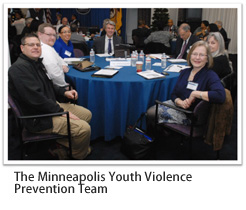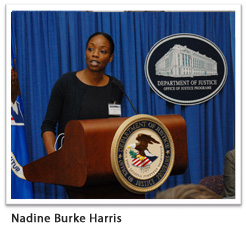National Forum on Youth Violence Prevention Working Session 2012
On December 10 and 11, representatives from the ten cities in the National Forum on Youth Violence Prevention (Forum) met together in Washington, DC. This was the first time representatives from all ten cities in the Forum – Boston, Camden, Chicago, Detroit, Memphis, Minneapolis, New Orleans, Philadelphia, Salinas, and San Jose – had an opportunity to share their work and exchange ideas. The Forum is a collaboration between the U.S. Departments of Justice, Education, Health and Human Services, Housing and Urban Development, and Labor, the former Office of National Drug Control Policy, and AmeriCorps (formerly the Corporation for National and Community Service). The 2012 Working Session participants included leaders from the ten Forum cities, federal staff, researchers, and other stakeholders.
 The four cities that joined the Forum in 2012 (Camden, Philadelphia, Minneapolis, and New Orleans) had an opportunity to share information about the youth violence prevention efforts in their communities, as well as achievements and challenges. In 2013, these cities will develop comprehensive youth violence prevention plans that address prevention, intervention, enforcement, and reentry. To see plans developed by the other Forum cities, click here. To learn how you could develop a plan for your community, see the Forum’s strategic planning toolkit
The four cities that joined the Forum in 2012 (Camden, Philadelphia, Minneapolis, and New Orleans) had an opportunity to share information about the youth violence prevention efforts in their communities, as well as achievements and challenges. In 2013, these cities will develop comprehensive youth violence prevention plans that address prevention, intervention, enforcement, and reentry. To see plans developed by the other Forum cities, click here. To learn how you could develop a plan for your community, see the Forum’s strategic planning toolkit
Sustainability is an important real consideration for stakeholders attempting to coordinate efforts and implement one or more evidence-based programs in a community. At the Working Session, Allison Metz from the National Implementation Research Network gave a presentation on the science of implementation and described how building capacity for implementation can lead to improved outcomes for youth, system and organization changes, and sustainability. Panelists also discussed strategies for staying the course in the face of short-and long-term challenges, such as a spike in violent crime or transitions in city leadership.
 A panel of presenters discussed Positive Behavioral Interventions and Supports (PBIS) as an example of a school-wide intervention that can improve safety and conditions for learning.
A panel of presenters discussed Positive Behavioral Interventions and Supports (PBIS) as an example of a school-wide intervention that can improve safety and conditions for learning.
Federal staff gave overviews of available training and technical assistance resources, and how those can be connected for planning and action at the local level. Participants engaged in interactive breakout sessions related to implementation, safe and supportive school discipline, information sharing, housing, reentry, youth employment strategies, and developing community coalitions through capacity building.
Jeffrey Butts and Caterina Roman shared an update on the Forum assessment, which demonstrated a number of potentially valuable improvements for five Forum sites, including an increased number of opportunities for youth, expanded community partnerships, and improved perceptions of local laws enforcement. This presentation also included information on how cities could approach partnerships with local researchers to assess their own impacts in their individual communities.


The Working Session offered an opportunity for the participants to engage in dialogue and presentations about the importance of trauma-informed care. Vince Felitti and Nadine Burke Harris shared information about the Adverse Childhood Experiences study and the use of a multi-disciplinary trauma-informed care approach in a pediatric health care setting. Representatives from Boston and Memphis discussed their efforts to connect youth violence prevention work with Defending Childhood initiatives in their cities. Leaders in both cities are working to prevent children’s exposure to violence as well as focusing on violence prevention among older youth and young adults. To learn more about the Working Session, view the agenda, participant list, presentation slides, and photo gallery. Learn more about youth violence prevention by visiting the Forum’s website.
